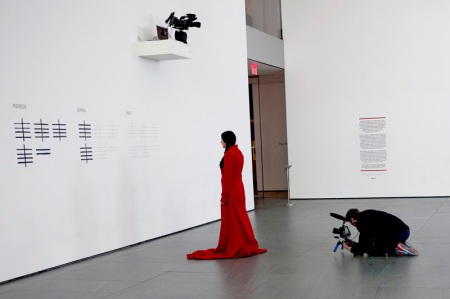
Marina Abramović and filmmaker Matthew Akers.
Photo: David Smoler. Courtesy of HBO and Music Box Films.
So last week, I had the momentous opportunity to interview Marina Abramović via Skype for the LA Weekly. The edited interview, which contains all the juiciest bits where she dishes at length about the 2011 MOCA Gala, her long-running conflict with Yvonne Rainer, the “unoriginality” of Dawn Kasper’s Whitney Biennial installation, how she didn’t get paid “one penny” for her Seven Easy Pieces show, and how the underground is for “plants,” appeared today on the LA Weekly arts blog. As a special bonus for ART! readers, I am posting below the parts of the interview that didn’t make it into the final cut.
Can performance art really be taught?
I think yes, because I’ve been doing now 27 years, teaching a lot—in Germany, France, Japan, so many different countries. First of all, it’s the same as painting or sculpture, you can teach the painting but you can’t make the great painter. You have to have what I call charismatic state of being. Let’s start from the beginning. When a student comes and says “I want to be a performance artist,” I am first questioning if they are an artist at all—sometimes they just want to be a little famous or something stupid like that. Then, if you are really an artist, you have to find which real media is good for you.
Sometimes you think you are a performance artist but you actually can’t perform. So it’s not easy, but what I can teach people is how to condition the body and the mind to get to that state, and then it’s up to them to do the performance. There’s lots of techniques which I kind of mixed up. I can teach them how to reduce things, how to begin, how to document, which mistakes they should not make. Lots of things I learned, I can give this kind of advice. So yes, you can teach performance, but you can’t make someone great. It’s a genetic thing, you either have it or you don’t have it.

You must be logged in to post a comment.